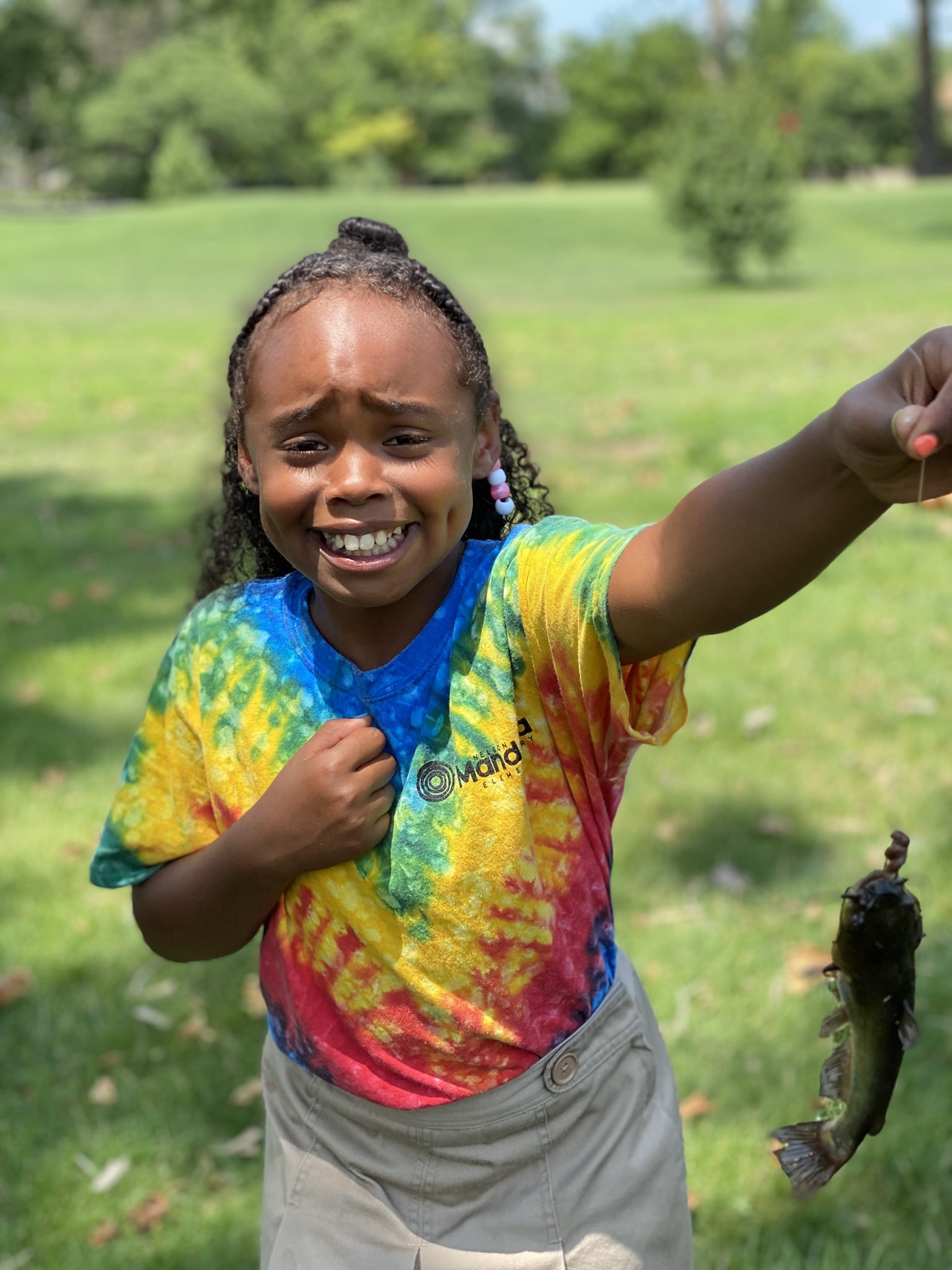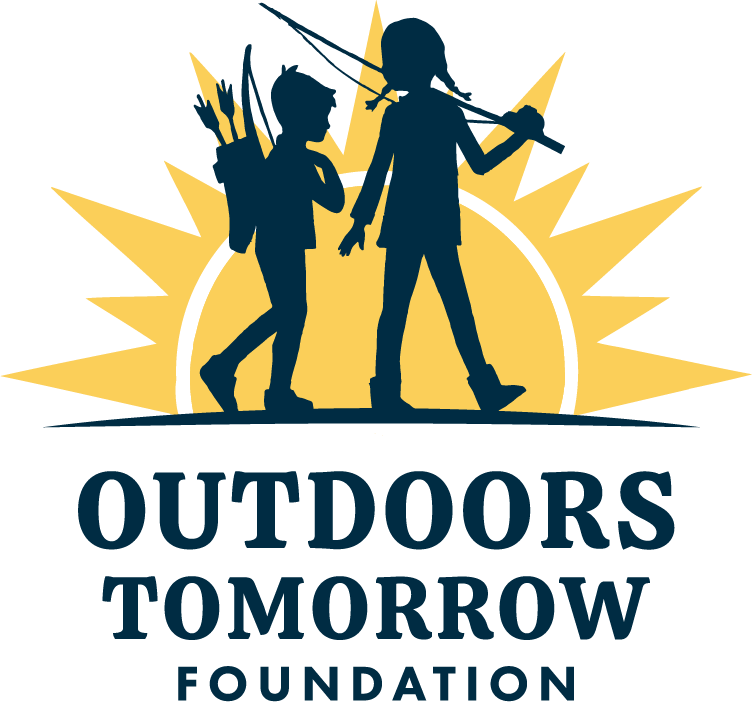
Fishing Fun for a Lifetime
By LeAnn Schmitt and Scot McClure, OTF Staff
Outdoor Adventures, the nation’s premier in-school outdoor education program developed and implemented by the Outdoors Tomorrow Foundation, gets kids outside! In the last issue of American Outdoor News, we featured the survival skills unit of Outdoor Adventures (OA). This time we focus on fishing, another of the most popular units in the class, which can cover as many as 34 different units depending on geographical location and available resources.
Ask a child when they caught their first baseball or softball, made their first basket, or kicked their first soccer ball and chances are they will not be able to tell you. However, if you ask a child when they caught their first fish, their face will light up, and they will have a picture and a story to share. Many kids today though say, “I’ve never been fishing.” This is the case with tens of thousands of kids who have caught their first fish in an Outdoor Adventures class since the program began more than a decade ago. This school year there are more than 75,000 students in OA in 770 public and private schools across 44 states. Many of these kids are catching their first fish, earning their hunter education certificate, their boating safety certificate, learning to shoot a bow, and much more, all in the context of a fully accredited PE class that can be taught in any school kindergarten through high school. One example is the Outdoor Adventures class in Southlake-Carroll middle school in Southlake, TX in which more than 1,000 kids have been recorded catching their first fish and the teacher created a “Fishing Wall of Fame.” Some schools even start competitive fishing teams as an outgrowth of the OA class.
Kids in Outdoor Adventures often take home their enthusiasm for their newfound skills, and we have received many stories over the years of parents who get involved in the outdoors because of their kids. If you have a kid in your life—sons, daughters, grandchildren, nieces, nephews, a friend’s child—who does not know how to fish, take the time to get them out to learn. And if any of the kids in your life are in Outdoor Adventures help them further their fishing skills. There is always a new method or place to try. By taking a child fishing and you will create a memory for a lifetime and teach them a valuable and enjoyable skill.
Fishing does not have to be complicated or expensive to enjoy. In Outdoor Adventures the students learn how to make a fishing line with string and an empty water bottle, but then go on to learn how to fish with a rod and reel both from shore and from a boat. They learn about different techniques as well as species of fish and their habitat. Outdoor Adventures classes near the coast teach saltwater fishing techniques, and students in northern states even learn ice fishing. Another unit in Outdoor Adventures teaches students how to craft fly fishing flies.
To take the kids in your life fishing, check out your local parks and rec department website for community lakes. Look up your state wildlife department’s website to find public fishing opportunities. Additionally, one of the best fishing resources online is the Take Me Fishing website.
One of the primary goals of every aspect of Outdoor Adventures is teaching kids to enjoy the outdoors safely and ethically. Some of the basic rules of fishing are:
- Youth should only go fishing under adult supervision.
- Keep at least one rod’s length between you and the next angler before, during and after you cast.
- Look behind you and to the side before casting to avoid hooking anyone or anything.
- Consider fishing with barbless hooks or have an adult bend the barbs down with pliers. If you hook yourself, anyone else, or a fish, a barbless hook will be easier to remove.
- Wear a properly fitting life jacket and fasten it securely. Eighty-five percent of drowning victims would be alive today if they were wearing a life jacket.
- To rescue a person who falls into the water: Reach the person with something they can hang on to; Throw a flotation device to them; Row out to them if you are in a boat; and then go for help! Do not jump in and risk drowning yourself.
- Use the “buddy system” when fishing. If something happens to you like slipping down a bank, your friend can help.
- When fishing in hot or wintry weather, protect head, eyes, hands, feet, and skin from exposure to wind and sun. In hot months, wear light colored clothing, hat, sunscreen, and take plenty of water with you. In cold months, wear layers of clothing, gloves, a knit hat, and waterproof shoes.
- If your line gets snagged when you have cast it out, gently jiggle your line back and forth and from side to side to loosen it. If you pull too hard, the hook and line could come loose with such force that it could fly back at you and hit you (or someone else).
- When cleaning a fish, always use safety glasses and gloves to protect your eyes and hands. Always cut away from your body when using a knife. State regulation booklets usually have good fish-cleaning tips for you.
The Take Me Fishing website has numerous resources to help you find places to take a child fishing. Many states have special seasonal stocking programs that allow you to try things like trout fishing. Many state natural resource agencies also have tackle loaner programs and designated free fishing days.
Always consult your state natural resource agency about fishing rules and regulations and be sure you have the proper licenses. Regulations vary state to state and even by body of water. Connecting with local fishing clubs or organizations like Trout Unlimited or the Coastal Conservation Association can help you connect with other like-minded fishing enthusiasts and offer organized fishing opportunities.
Fishing is one of the easiest, most affordable, and most accessible ways to introduce kids to the outdoors. the accompanying photos are of Outdoor Adventures students enjoying their newly learned fishing skills. We know Outdoor Adventures is successful because of comments like this one, a parent shared with their child’s Outdoor Adventures teacher, “I’m so happy my child has something they want to do instead of being on their phone. I can’t wait to take them fishing again.” Enjoy taking your kids fishing.
